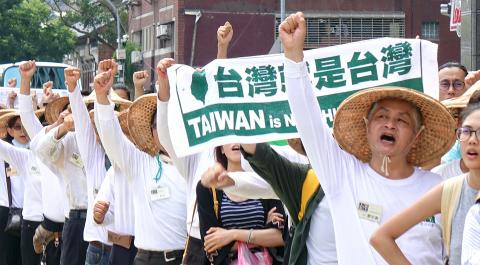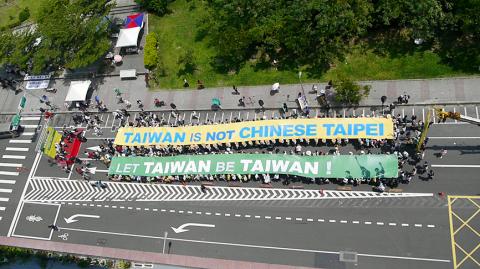The nation should be referred to as “Taiwan,” not “Chinese Taipei,” at international sporting events, a range of Taiwanese independence groups said yesterday, unfurling huge banners outside the Democratic Progressive Party (DPP) headquarters in Taipei in a bid to raise international awareness.
Hundreds of people affiliated with the Taiwan Radical Wings party, the People Rule Foundation, the World United Formosans for Independence and other groups opened massive banners reading “Taiwan is not Chinese Taipei” and “Let Taiwan be Taiwan” in English, while shouting “Go Team Taiwan” in English, Mandarin and Hoklo (commonly known as Taiwanese).
“Last month, we realized that the Universiade was coming up, and Taiwan was going to be faced with using ‘Chinese Taipei’ again, which is extremely sad, because ‘Team Taiwan’ is what we really want to be cheering,” said Taiwan Radical Wings deputy head Joyce Lin (林春妙), who served as the spokesperson for yesterday’s Taiwan Name Rectification Action Working Group.

Photo: Liu Hsin-de, Taipei Times
Videos of the unfurling are to be published online in English, French, Spanish, Norwegian and other languages “to show the world that Taiwan does not want to use ‘Chinese Taipei,’” she said.
The Summer Universiade is scheduled to begin on Saturday, but has drawn controversy domestically over requirements that the nation be officially referred to as “Chinese Taipei” following a 1979 International Olympic Committee resolution allowing for the nation’s continued participation in international sporting events.
Additional controversy over the name erupted yesterday after the English version of an official Universiade brochure was found to have used the name to replace geographical references to Taiwan before being corrected by the Taipei City Government.

Photo courtesy of Taiwan Radical Wings
“The incident was extremely humiliating for Taiwan, because the city government should not have had to wait until being criticized to change this, but it definitely helps people see that there are forces trying to keep us from using ‘Taiwan,’ which underscores the importance of today’s action,” Lin said.
The group is to distribute a Taiwanese flag popular among independence groups outside of competition venues and collect signatures for a petition to rectify the name for the 2020 Tokyo Olympics, she said.
They had chosen not to protest outside event venues because they do not want to create a disturbance, instead organizing yesterday’s event as an alternative, said Alliance for Safeguarding Taiwan member Jimmy Chen (陳政德), a key organizer in bringing the groups together.
“Taiwanese have spent NT$20 billion [US$658.8 million] to invite the world’s premier college athletes and international media to come to Taiwan. We hope that they feel at home and leave with a great impression, but what is tragic and what we are worried about is that under the rules, they might not even know their host’s real name,” he said.
While Lin and other key volunteers were all members of Taiwan Radical Wings, which aligned with the Taiwan Solidarity Union to compete against the DPP in the last legislative election, they were careful to define the event as an “action” rather than a “protest” directed at the DPP, despite its location.
“We want to speak to all Taiwanese and the entire world, not just the DPP,” Lin said, adding that the DPP had opened the upper floors of its headquarters to allow people to take overhead pictures.
Participant Lu Mei-ju (盧美如) said she came because she hoped Taiwanese could “hold their heads high” and walk out from under Chinese restrictions while participating in international society.
However, she also expressed regret over the lack of participation by young people in yesterday’s event.
“I did not think that the majority of participants would be older,” she said. “Taiwan’s future is in the hands of young people, but it seems that old people are helping them defend and preserve their future.”

SECURITY: As China is ‘reshaping’ Hong Kong’s population, Taiwan must raise the eligibility threshold for applications from Hong Kongers, Chiu Chui-cheng said When Hong Kong and Macau citizens apply for residency in Taiwan, it would be under a new category that includes a “national security observation period,” Mainland Affairs Council (MAC) Minister Chiu Chui-cheng (邱垂正) said yesterday. President William Lai (賴清德) on March 13 announced 17 strategies to counter China’s aggression toward Taiwan, including incorporating national security considerations into the review process for residency applications from Hong Kong and Macau citizens. The situation in Hong Kong is constantly changing, Chiu said to media yesterday on the sidelines of the Taipei Technology Run hosted by the Taipei Neihu Technology Park Development Association. With

CARROT AND STICK: While unrelenting in its military threats, China attracted nearly 40,000 Taiwanese to over 400 business events last year Nearly 40,000 Taiwanese last year joined industry events in China, such as conferences and trade fairs, supported by the Chinese government, a study showed yesterday, as Beijing ramps up a charm offensive toward Taipei alongside military pressure. China has long taken a carrot-and-stick approach to Taiwan, threatening it with the prospect of military action while reaching out to those it believes are amenable to Beijing’s point of view. Taiwanese security officials are wary of what they see as Beijing’s influence campaigns to sway public opinion after Taipei and Beijing gradually resumed travel links halted by the COVID-19 pandemic, but the scale of

A US Marine Corps regiment equipped with Naval Strike Missiles (NSM) is set to participate in the upcoming Balikatan 25 exercise in the Luzon Strait, marking the system’s first-ever deployment in the Philippines. US and Philippine officials have separately confirmed that the Navy Marine Expeditionary Ship Interdiction System (NMESIS) — the mobile launch platform for the Naval Strike Missile — would take part in the joint exercise. The missiles are being deployed to “a strategic first island chain chokepoint” in the waters between Taiwan proper and the Philippines, US-based Naval News reported. “The Luzon Strait and Bashi Channel represent a critical access

Pope Francis is be laid to rest on Saturday after lying in state for three days in St Peter’s Basilica, where the faithful are expected to flock to pay their respects to history’s first Latin American pontiff. The cardinals met yesterday in the Vatican’s synod hall to chart the next steps before a conclave begins to choose Francis’ successor, as condolences poured in from around the world. According to current norms, the conclave must begin between May 5 and 10. The cardinals set the funeral for Saturday at 10am in St Peter’s Square, to be celebrated by the dean of the College